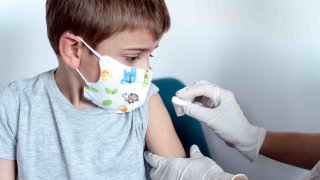
Infants, toddler and preschools from 6 months old to age 5 are newly eligible to receive the COVID-19 vaccine following a recommendation from the Centers for Disease Control and Prevention Saturday.
The CDC decided that coronavirus vaccines should be opened to nearly all children, with CDC Director Dr. Rochelle Walensky giving the final signoff Saturday afternoon.
“We know millions of parents and caregivers are eager to get their young children vaccinated, and with today’s decision, they can,” Dr. Rochelle Walensky, the CDC's director, said in a statement.
As new groups become eligible for COVID vaccines, some people are asking the latest vaccination recommendations from the CDC for all Americans.
Feeling out of the loop? We'll catch you up on the Chicago news you need to know. Sign up for the weekly Chicago Catch-Up newsletter here.
Here's guidance from federal health officials:
Adults age 18 and older
Pfizer and Moderna: fully vaccinated after two doses
- One booster recommended at least 5 months after the final dose in the primary series
- Second booster recommended for adults ages 50 years and older at least 4 months after the first booster
Local
Johnson & Johnson: fully vaccinated after single dose
- One booster, preferably of Pfizer or Moderna, recommended at two months after the final dose in the primary series
- Second booster recommended for adults ages 50 years and older at least 4 months after the first booster
Children and teens ages 12-17
Pfizer: fully vaccinated after two doses
- One booster recommended at least 5 months after the final dose in the primary series
Children ages 5-11
Pfizer: fully vaccinated after two doses
Note: no booster shot recommended for this age group
Children and infants 6 months old to age 5
Pfizer: fully vaccinated after three doses
Note: shots are one-tenth of the adult dose
Moderna: fully vaccinated after two doses
Note: shots are a quarter of the adult dose
In a study of kids ages 6 months through 5 years, two Moderna shots — each a quarter of the regular dose — triggered high levels of virus-fighting antibodies, the same amount proven to protect young adults, the company said.
The shots triggered fewer fevers than other routine vaccinations, officials said.
The vaccine proved between about 40% and 50% effective at preventing symptomatic COVID-19 during the trial. The company blamed the omicron variant's ability to partially evade vaccine immunity, noting that unboosted adults showed similarly less effectiveness against milder omicron infections.
While no children became severely ill during the study, Moderna noted high antibody levels are a proxy for protection against more serious illness — and the company will test a child booster dose.
At the same time, preliminary data suggested Pfizer and its partner BioNTech's three-dose series is 80% effective in preventing symptomatic COVID, the companies said, but they cautioned the calculation is based on just 10 cases diagnosed among study participants by the end of April.
So far, studies from Moderna and Pfizer showed that side effects, including fever and fatigue, were mostly minor.
Heart inflammation sometimes occurs in teens and young adults, mostly males, after receiving either the Pfizer or Moderna vaccines.
However, the CDC recently found the risk of myocarditis and other inflammatory syndromes was higher following an infection from COVID than after Pfizer or Moderna vaccination in males and females ages 5 and older.
Moderna previously said that, armed with additional evidence, it was updating its FDA application for teen shots and requesting a green light for 6- to 11-year-olds, too. Dr. Stephen Hoge, Moderna’s president, said he’s optimistic the company will be able to offer its vaccine “across all age groups in the United States by the summer.”
Moderna says its original adult dose — two 100-microgram shots — is safe and effective in 12- to 17-year-olds. For elementary school-age kids, it’s using half the adult dose.
About 1.5 million adolescents have used the Moderna vaccine in other countries, “and so far we've seen very reassuring safety from that experience," Hoge said.
The heart risk also seems linked to puberty, and regulators in Canada, Europe and elsewhere recently expanded Moderna vaccinations to kids as young as 6.
“That concern has not been seen in the younger children,” said Northwestern’s Muller.
Why do health officials say children should be vaccinated?
While young children generally don’t get as sick from COVID-19 as older kids and adults, their hospitalizations surged during the omicron wave and FDA’s advisers determined that benefits from vaccination outweighed the minimal risks.
Walensky said pediatric deaths from COVID-19 have been higher than what is generally seen from the flu each year.
“So I actually think we need to protect young children, as well as protect everyone with the vaccine and especially protect elders,” she said.



